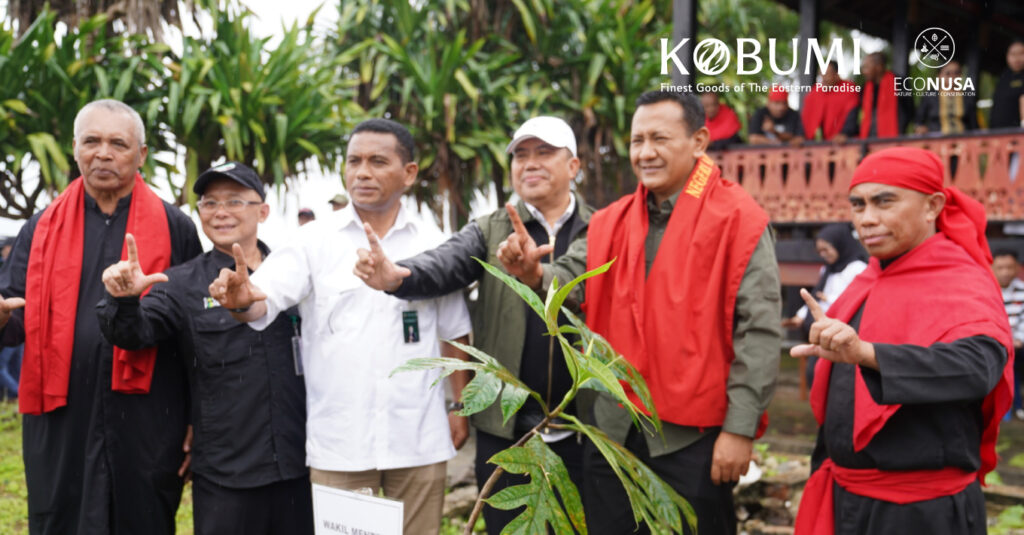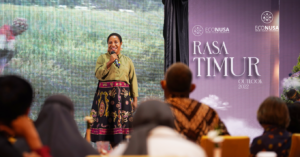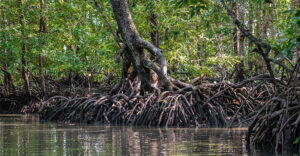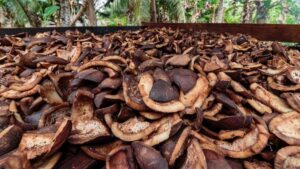
A forest is not only about towering trees or the wildlife beneath their canopy. In Hutumuri Village, Ambon, the forest is an ancestral heritage, a source of livelihood, and a hope for the future. The Ministry of Forestry has designated the Hutumuri Customary Forest in South Leitimur District as a national model for Indigenous community-based forest management. This recognition was announced directly by Deputy Minister of Forestry Rohmat Marzuki during his visit to Hutumuri Village.
Covering 150 hectares, the forest sustains the lives of more than 5,000 people from 1,600 households. The Indigenous community has managed the forest sustainably through non-timber forest products such as nutmeg, honey, cloves, pineapple, virgin coconut oil (VCO), and ecotourism, generating an economic value of IDR 54.6 billion (≈ USD 3.3 million) per year. The Ministry of Forestry had previously awarded the Hutumuri Customary Forest as First Place Winner of the 2025 Wana Lestari Award.
“Hutumuri has become a national role model. They have proven that Indigenous communities are capable of protecting forests while improving their welfare independently,”
said Rohmat.
On this occasion, the Indigenous community handed over a customary forest boundary signboard to Deputy Minister Rohmat Marzuki, an important requirement for formal zoning of customary forests, in line with the operational guidelines of the Regional Forest Area Center (BPKH) Region IX. The zoning process was supported by the Ambon Social Forestry Agency, the Maluku Provincial Forestry Office, the Maluku UPTD Forestry Unit, and the EcoNusa Foundation.
Spice Exports: From the Forest to the Global Market
As part of the same event series, Secretary-General of the Ministry of Forestry Mahfudz and Governor of Maluku Hendrik Lewerissa launched a spice export shipment at Yos Sudarso Port, Ambon. The shipment included commodities from KOBUMI Indonesia, also supported by the EcoNusa Foundation.
A total of 15 tons of nutmeg from agroforestry systems and 30 tons of damar resin sourced from the Hutumuri Customary Forest and other Maluku social forestry areas were shipped to China and India, with a total export value of USD 125,000. The export initiative empowered 165 local workers, including 61 women, who play an integral role in the sustainable supply chain.
After the export release, the delegation visited a spice processing facility in Hutumuri, where local communities transform forest products into export-quality goods such as VCO, jamale syrup, and candied ginger.
Mahfudz also visited the KOBUMI warehouse in Ambon to inspect the spice processing facilities managed by Indigenous communities with EcoNusa’s support.
Partnerships and Multi-Stakeholder Synergy
This initiative is part of the follow-up to a Memorandum of Understanding (MoU) between EcoNusa and the Ambon Social Forestry Agency, signed on August 20, 2025. The MoU strengthens cross-sector collaboration to accelerate the Social Forestry Program, including the signing of a new cooperation agreement between BPS Ambon and the Faculty of Agriculture, Pattimura University (Unpatti).
Deputy Minister Rohmat Marzuki emphasized that by July 2025, the Ministry had officially recognized 160 customary forests covering nearly 400,000 hectares, encompassing 83,000 households across 19 provinces.
“Once regional legal status is established, we must act quickly. Hutumuri is a prime example of how communities can thrive without deforestation,” he stated.
From Maluku, the management of customary forests is not only about protecting the Earth, but also about forging a path toward a sustainable and empowered future.








